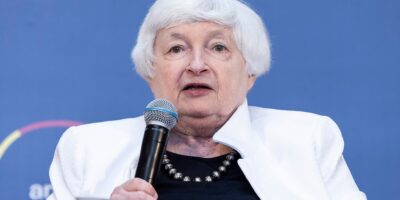Alan Blinder’s Inflationary Incoherence

“Predictions are hard, especially about the future,” the old saw goes. We economists have not clothed ourselves in glory with our forecasts. Many economics commentators confidently proclaimed inflation would be “transitory.” Instead, we got sustained price hikes, including the sharpest increases in 40 years.
I myself was too sanguine about inflation, so I’m hesitant to cast stones. Nevertheless, basic honesty requires us to own our mistakes. It’s even more important to set the record straight when you’re an influential figure with the ear of the powerful. That’s why Alan Blinder’s recent opinion article and letter to the editor in the Wall Street Journal are so concerning. Instead of recognizing his mistakes on inflation and correcting them, Blinder—a Princeton professor and former Fed vice chair—is doubling down.
Blinder’s historical revisionism began in mid-July, when he published his commentary piece defending the supply-side inflation hypothesis. According to this view, production and transportation bottlenecks rather than loose fiscal and monetary policies were the cause of rapid dollar depreciation.
To be clear, there were problems on the supply side. The pandemic raised the costs of producing and distributing goods across the world. Governments made it even costlier by enacting social distancing requirements and lockdowns. Unsurprisingly, transportation costs shot up. Look at what happened to global shipping prices in 2020 and 2021:
This seems to support Blinder’s view. But wait: We also must consider what happened after the pandemic receded and policy relaxed. Prices went up during the months when demand outpaced supply, but then fell back down to their original levels. If price patterns like these were behind inflation, we should have been experiencing outright deflation in late 2022 and early 2023. Yet all the recent inflation data releases have shown continued broad-based price increases. All we’re getting is a slowdown in the rate of inflation.
Disinflation is very different from deflation. The supply-side inflation theory doesn’t fit the facts. Demand-side inflation does, especially when you consider total dollar spending in the economy is significantly elevated above its pre-pandemic trend—something that only fiscal and monetary policy can explain.
John Cochrane, a prominent financial economist, made similar points in a recent opinion article. Blinder published a letter to the editor responding to Cochrane insisting supply-side inflation was the real deal. Blinder waves away Cochrane’s objections by claiming, “All that needs to happen is that when energy-related prices rise, many other prices, being sticky downward, don’t fall.”
Blinder’s argument is, frankly, not much of an argument. He is essentially saying that prices don’t fall if prices don’t fall. Why don’t prices fall? Saying they are “sticky downward” is not an answer. It is just another way of saying that prices don’t fall.
Energy and transportation are crucial inputs for nearly all goods. In a competitive economy, prices track costs. It’s strange to point to supply-side restrictions as the cause of inflation, but then relieve them of any explanatory burden when the restrictions ease.
Blinder offers another sleight of hand in responding to the “what goes up, must come down” argument made by Cochrane and others against supply-side inflation. Blinder insists that we shouldn’t expect prices to fall “unless the prices of the goods afflicted by supply shocks return to the status quo ante and persistent inflation doesn’t creep into other prices. Neither has happened in this episode.”
Did you see what he did here? Blinder assumed his conclusion! He’s using the current inflationary episode, which is the issue under dispute, as evidence for the supply-side view without establishing even a single accepted premise for his position. At best, he’s confusing a description for an explanation. At worst, he’s being flippant.
There’s nothing wrong with making incorrect predictions. It happens to all of us. There is something wrong with obstinacy in the face of overwhelming contradictory evidence. Blinder’s attempted rehabilitation of supply-side inflation is chocked full of elementary errors that are beneath an economist of his caliber and credentials.









